Today’s guest is Meredith Efken, who has written a fascinating novel about adopting a child from China. I’d love to share her book with someone who is interested in this topic. Please leave a comment below or email me privately, and I’ll draw a name on Friday to win LUCKY BABY. [Update: Congratulations to Laura! She won the free copy of this book!]

Hi Meredith. I was excited about reading your book because I know several families who’ve adopted daughters from China. Can you tell us about your inspiration for writing LUCKY BABY?
In 1999, my husband and I adopted our oldest daughter from China. She was fourteen months old, and neither she nor her new parents had the faintest clue what to do with each other. Becoming a family, with the addition of our second (non-adopted) daughter three years later, was this miraculous, inspiring, and sometimes heart-breaking journey. I wanted to write about that journey — not just the usual “orphan finds family in happy-ever-after ending.”
The adoption became the hook for the story, but what I really ended up exploring was the process of becoming a mother — that process of being broken, being shaped, of dying, living, of losing all control over your heart because it doesn’t belong to you any more — and how thrilling, and frightening, and painful it all can be.
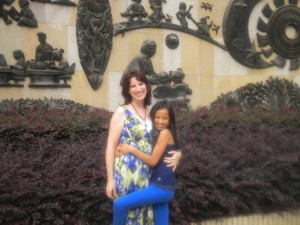
Your novel gave me a lot of new insight into the emotions involved on both sides of adoption. How much of Meg and Eva’s story was similar to you and your daughter’s?
Much of it is quite different, actually. My daughter was much younger than Eva when we adopted her, and she didn’t have any physical disabilities (even though we’d been told she did.) Eva’s attachment problems are also far more severe than anything our daughter has experienced, though some of the questions and internal conflict about birth parents and adoptive parents — and their roles in her life — are ones that are very common not just for my daughter but for many adopted children everywhere.
My own family and upbringing, as well as my husband’s, are drastically different (and much more positive) than those of Meg and Lewis in the story. That’s been one of the interesting things about this novel and people’s reaction to it — I must have hit a lot of the emotional notes correctly, because many people assume the story is a lot more autobiographical than it is.
But I did draw on some of my own insecurities and fears about parenting, as well as the stories and experiences of many, many mothers — both adoptive and not. Even though the emotions in the story are not always from my own experience, they are the experiences of many other families. I hope the truth of those experiences comes through in the book.
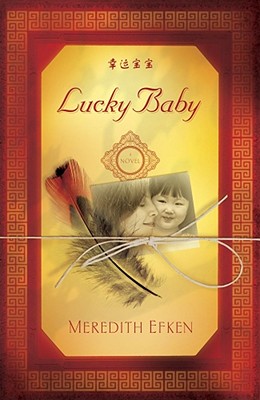
What made you decide to focus on such a difficult aspect of the adopting experience? (i.e., attachment disorder). Is this common, especially for families who adopt an older child?
Well, first, let me just adjust the question a bit. “Attachment disorder” is a specific psychological disorder that can affect any child who has been neglected or undergone trauma as an infant or toddler — not just children who are adopted. A psychologist can evaluate a child for RAD (Reactive Attachment Disorder) and recommend therapy and support for the child and the family, but it is definitely a challenging and difficult disorder to work with.
However, RAD is distinct from having problems adjusting to a family or problems developing attachment after an adoption. I think it’s not an either/or situation — RAD or no problems at all. There is a wide range of experience between those two extremes. Not every child who struggles to adapt to their adoptive family has RAD. And not every child who is adopted has attachment problems — no one really understands what causes some children to struggle while others seem to have no problems at all. It’s very complicated.
That said, nearly all adopted children do have struggles unique to the adoption experience. They’ve all experienced a trauma early in life — that of losing their birth parents, even if they can’t remember it. There is a grief process they must go through to deal with that loss. Additionally, a child who has been in an orphanage or foster family experiences loss a second time when they go from that placement to their adoptive family. Even though the adoption provides the benefit of a stable, permanent, loving environment, the loss of the familiar is still traumatic.
That double loss has consequences. It affects a child in often-profound ways. So I chose to write about that, showing one child’s process of grieving and coming to terms with her loss and the impact that has on her family and friends. I don’t consider Eva to have actual RAD. She has experienced deep loss that is far bigger than what she can process on her own, and so she does end up needing the help of a therapist to work through those issues before she can really integrate into her new family.
The process of grieving for what has been lost and then moving forward with a new family looks different for each child. Some children have a much more difficult time than others. Some seem to adjust fine in childhood, but will have to deal with their grief as adults. Others seem to come through it all very smoothly at a young age and are fine. I don’t think that the age of the child at adoption necessarily impacts their attachment or adjustment by itself. My understanding is that there is an entire range of factors that can impact how a certain child reacts to an adoption.
It’s something all adoptive parents need to be aware of, but not fearful of. Adopted children — especially ones who have been in an institutional setting like an orphanage — by the very fact of being adopted have special needs that their new parents have to be prepared to deal with.
Getting support early and being patient, educating themselves, and being committed to the process for as long as it takes are what adoptive parents need to plan on if they choose to adopt. It’s not always easy, but the good news is that the vast majority of adopted children do adapt, and do go on to have very productive, healthy lives. There is a lot of support and a lot of hope available to families who are working through this process.
Thank you, Meredith, for all of this valuable information! While reading your book, I really felt like I was visiting China. You describe the sounds, smells, and sights that take your reader there. How did you learn so much about China? What is your favorite place to visit?
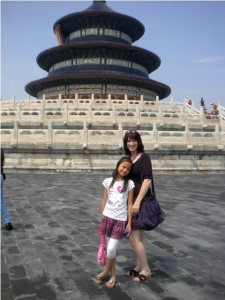
We traveled to China for the adoption in 1999. We spent a couple days in Beijing, about a week in our daughter’s birth city for the adoption, and then about another week in Guangzhou, to go through the immigration process to bring her home. Much of my description of China was based on that trip, including our short tour of our daughter’s orphanage.
When I needed to fill in all the many gaps in my knowledge (since two weeks is hardly enough time to really understand a foreign country), I went to a variety of sources, including blogs of expats living in China, some Chinese friends living in my city, videos on YouTube, and other adoptive families. The hardest part was portraying life in a private Chinese home in China, since I haven’t had the opportunity to actually visit anyone’s home in China.
I found videos on YouTube of people in China getting together with friends in their homes, and I also used real estate listings to see photos of the interiors of various homes in Shanghai. I did a lot of reading about how they celebrate holidays such as Chinese New Year, what foods they eat — like for breakfast — and from there I used my imagination.
My daughter and I traveled back to China last summer (2009), and I was amazed at the difference 10 years has made in the nation. I had to make some last-minute adjustments to my book based on that trip because the country as a whole has become so much more developed over the past decade.
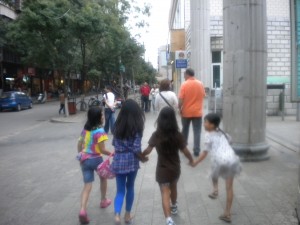
My favorite place I’ve visited is definitely Kunming, in Yunnan Province. The weather is beautiful, the people are friendly, and Yunnan is home to over half of the ethnic minorities that live in China, so the cultural heritage is extremely rich. Plus, they have some beautiful parks and lots of flowers. The food is amazing, too.
You mention Chinese phrases often in your writing. Have you studied the Chinese language? In your book, parents Meg and Lewis want their daughter Eva to retain some of her cultural heritage by learning Chinese. Do you think it’s a good idea for children adopted from China to keep in touch with their native language in some way?
I have studied Chinese just a very little bit. It’s a beautiful language, and not nearly so hard as it has a reputation of being. We’ve got classes in our city that are specifically for adoptive families, but due to our daughter’s dance schedule (she’s intensely pursuing ballet as a possible career) we haven’t been able to make the Chinese classes.
Most of the phrases in the book were either translated for me by Chinese acquaintances or were taken from phrase lists for adoptive families on the internet.
I think children adopted from a different culture should always be offered as many opportunities as possible to learn about and interact with that culture. But each child’s level of interest in doing so is going to be different. I don’t think it’s good to force it on them.
As far as language-learning goes, I think it’s a good idea if the opportunity is there. But realistically, unless the adoptive parents are fluent in the language and use it regularly at home, a child isn’t going to become bilingual or even fluent just by weekly language classes. The exposure to the language is good — it’s good for any child to learn a second language. Learning Chinese is an especially good idea right now, considering that it is becoming a more dominant force globally.
I confess I got hungry for Chinese cuisine while reading your book. It’s full of references to delicious food! What is your favorite Chinese food? Can you find it where you live in the U.S.?
I have to say — if all you’ve experienced of “Chinese food” is in a Chinese restaurant in America, you are missing out. Real Chinese food is completely different — a tremendous variety of flavors and ingredients (a few are far too exotic for my comfort!). It’s quite an adventure!
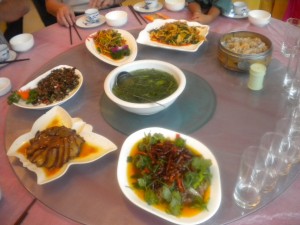
Some of what I like best in real Chinese food (which varies greatly by region of the country) are the simple dishes — the stir-fried green beans or the mushrooms. I even had a friend in the States once who stir-fried spaghetti squash and sliced sweet peppers, and it was heaven. They don’t actually use such thick sauces as the restaurants here do. The sauce is generally more broth-like, and it lets the flavor of the vegetable really come through.
I also like the dumplings and stuffed buns — which they do serve in some parts of China, though I don’t think it’s quite as common as the dim sum restaurants in our American Chinatowns are.
We had one dish in Kunming during our 1999 trip that I’ve been dreaming of ever since. It was called Yunnan Flavor Soup, though I think it may be called “Over The Bridge Soup” in other parts of the country. The waiter brought us super-heated broth, and a tray of raw meat slices (I wasn’t a vegetarian at that point) which we cooked in the soup broth itself. Then we added vegetables, noodles, and what I believe was a quail egg. The broth cooked all of it, and it was simply delicious–and so much fun to assemble and “cook” it ourselves.
I have not been able to find a recipe for it or any restaurant that makes it, but if anyone knows of a recipe for it, I’d love to have it.
Throughout the book, you weave in certain symbols, such as ladybugs, dragons, and a dream-like Chinese woman who appears at various points in Meg’s journey. Can you tell us how you got interested in writing using magical realism? How do you think it adds to the story?
I really struggled in writing this book to adequately express the sense of wonder and the miraculous nature of the adoption experience. Plain old prose just didn’t seem to do it, and it was quite frustrating from an artistic standpoint. I’d been reading about magical realism as a genre, and it intrigued me conceptually — the writers attempt to flip-flop reality by portraying the fantastic as normal and the mundane as magical — but much of classic magical realism is darkly political in nature and didn’t really appeal to me.
Then I came across some women writers of magical realism, such as Isabel Allende, Sarah Addison Allen, and Alice Hoffman, and their blend of women’s fiction with magical realism techniques really appealed to me.
What the magical realism did for me in writing LUCKY BABY was to make it possible for me to convey the mystical and miraculous journey of the heart that is adoption. It also was a way for me to express my view of faith. As a Christian, I find that my faith is mystical, a bit fantastical to some, and rooted in the supernatural — and yet, it impacts my daily life in ways I nearly take for granted. And at the same time, that faith gives me an appreciation and a wonder for the most mundane of human experiences — eating good food, the beauty of a perfect sunset, the personal connection of one hand holding another. Magical realism seemed a perfect reflection of how I experience God at work in me, so I wanted to try it in this story.
Do you have any advice for families who are interested in international adoption? Are there any organizations you’d specifically recommend? Is it helpful to join an online support network when someone is merely exploring the option?
Don’t rush into it. Count the cost — not just financially, but also in terms of time, emotional energy, and the level of effort involved in caring for a child that has been institutionalized. There are challenges and difficulties that are unique to international adoption, and parents have to be prepared to love their child no matter what — even in the unlikely event that the child can’t love them in return.
I’ve had people suggest that by adopting, we took the easy way out because I didn’t have to go through pregnancy and delivery. And after having been pregnant as well, I can say that physically, adoption is much easier. But adoption has deeply emotional ramifications, and there are no guarantees that it will go smoothly. So long term, I think adoption is harder for parents. They’ve got to be prepared for that and willing to be that rock for their children when it gets hard.
If parents aren’t sure they can do that, then it’s better for them and for the child not to adopt. But if they are willing to take on the challenge and uncertainty, I think they’ll find that the adoption journey is amazing, beautiful, and well worth it all.
Definitely join an online or in-person support group at any phase of the adoption process. There’s so much to learn. It’s hard to list any websites these days because there are so many really great ones, but one of the longest-standing ones and most comprehensive is RainbowKids.com
Was it difficult for you to make the transition from humorous mom-lit to this novel, where you sometimes write from a Chinese orphan’s point of view? How did your creative coach help you in this process?
It wasn’t the transition that was difficult — because I knew I couldn’t personally manage to make this story a comedy. You have to have a certain amount of distance and perspective to write humorously — at least I do. And I realized early on that I had no distance and no perspective whatsoever when it came to writing about Chinese adoption. It’s why it took me eight years just to decide to write it at all.
The emotions run so deep and strong for me, and my own expectations were so high for doing it well, that it actually crippled me for awhile as I was trying to write. This is where my creativity coach stepped in and was an invaluable part of helping me get past the expectations and self-doubt. She helped me identify exactly what was holding me back from being able to write, and then came up with mental exercises and techniques for dealing with those doubts or concerns. It was all very simple stuff, but it was very effective in helping me get my confidence back.
But there were still parts of the book that were incredibly difficult to write — won’t say which ones here because it would involve spoilers for the plot. There’s a quote about writing by Walter Wellesley “Red” Smith: “There’s nothing to writing. All you do is sit down at a typewriter and open a vein.” I have no idea who he is and I’ve never read his work, but for the first time in my writing career, in writing LUCKY BABY I found the truth to his statement.
The act of emotionally “opening a vein” as I wrote was terrifying and painful, but also exhilarating. It stretched my writing skills in a way that wouldn’t have happened with comedy — as difficult as comedy actually is. So from an artistic standpoint, it was thrilling to have a chance to grow and write something so different from what I’d done before.
In writing LUCKY BABY, a novel about an American couple adopting a child from China, what was the most important message you wanted to convey?
I wanted to show the complexity of international adoption — the beauty and hope, but also the difficulties. It’s not a fairy tale where the rich American swoops in to rescue a foreign orphan and takes them away to a happy-ever-after life, or where the lonely, childless couple has their dearest wish come true.
Adoption is a beautiful, hope-filled way to build a family, but the hard truth is that it is built on a tragedy — the separation of a child from its birth parents. And there are always consequences of that tragedy that families will face. With international adoption, you have the added challenges of the loss of the child’s birth culture. I wanted to present these issues honestly because this is not a fairy tale.
Becoming a family is a long journey and it can be a hard one. But at the same time, I wanted to show the hope and beauty and healing that the adoption journey can bring as well.
Meredith Efken is also author of the critically acclaimed SAHM I Am series that traces the friendship of a group of stay-at-home mothers through their emails to each other. In addition to writing, Meredith owns the Fiction Fix-It Shop, which offers freelance fiction editing and writing coaching.
P.S. Don’t forget — if you’d like to enter your name to win a free copy of Meredith Efken’s LUCKY BABY, leave a comment below or email me at the address to your left. I’ll draw a name on Friday and will contact you for an address to send this amazing book!



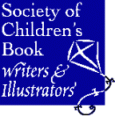


6 Responses to Book Giveaway and Interview: Meredith Efken’s LUCKY BABY